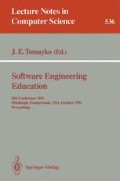Abstract
The report Computing Curricula 1991 contains curricula recommendations for baccalaureate programs in the area of computing, which includes programs with the titles "computer science," "computer engineering," "computer science and engineering," and other similar titles. Its recommendations provide a uniform basis for curriculum design across all segments of the educational community — schools and colleges of engineering, arts and science, and liberal arts. That report is also the first comprehensive undergraduate curriculum report to be jointly prepared and endorsed by the Association for Computing Machinery and the Computer Society of the IEEE.
The guidelines provide coverage of new and updated subject matter, including a detailed breakdown of individual lecture and laboratory topics. Fundamental areas of concern in curriculum planning are also addressed: program goals; course design and sequencing; integration of laboratory work; the role of programming and other related educational experiences.
Because the computing field is changing and because guidelines must be applicable to a variety of programs, the report focuses on the process of curriculum design in the discipline of computing. Instead of providing a detailed design for a curriculum in computing, the report provides a set of requirements for programs of study in this area. These include a collection of computing subject matter topics to be included in every student's program and a set of advanced elective subject matter topics. Also included are course requirements in mathematics and science.
This paper considers the implications of the report for programs specializing in software engineering. The basic recommendations of the report are presented and discussed. A comparison of the implementation with the SEI Undergraduate Curriculum in Software Engineering will be given.
Preview
Unable to display preview. Download preview PDF.
References
ACM/IEEE-CS Joint Curriculum Task Force. Computing Curricula 1991. Technical report, ACM Press and IEEE-CS Press January 1991.
Peter J. Denning, Douglas E. Comer, David Gries, Michael C. Mulder, Allen B. Tucker, A. Joe Turner, and Paul Young. Computing as a Discipline. Communications of the ACM, 32(1): 9–23, January 1989.
Gary Ford. 1990 SEI Report on Undergraduate Software Engineering Education. Technical report CMU/SEI-90-TR-3, Software Engineering Institute, Carnegie Mellon University, Pittsburg, PA, March 1990.
Gary Ford. The SEI Undergraduate Curriculum in Software Engineering, SIGCSE Bulletin, (23)1:375–385, March 1991
David L. Parnas. Education for Computing Professionals. Computer, 23(1):17–23, January 1990.
Author information
Authors and Affiliations
Editor information
Rights and permissions
Copyright information
© 1991 Springer-Verlag Berlin Heidelberg
About this paper
Cite this paper
Barnes, B.H., Rogers, J.B. (1991). Computing curricula 1991 its implications for software engineering education. In: Tomayko, J.E. (eds) Software Engineering Education. SEI 1991. Lecture Notes in Computer Science, vol 536. Springer, Berlin, Heidelberg. https://doi.org/10.1007/BFb0024288
Download citation
DOI: https://doi.org/10.1007/BFb0024288
Published:
Publisher Name: Springer, Berlin, Heidelberg
Print ISBN: 978-3-540-54502-6
Online ISBN: 978-3-540-38418-2
eBook Packages: Springer Book Archive

